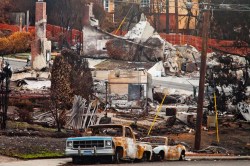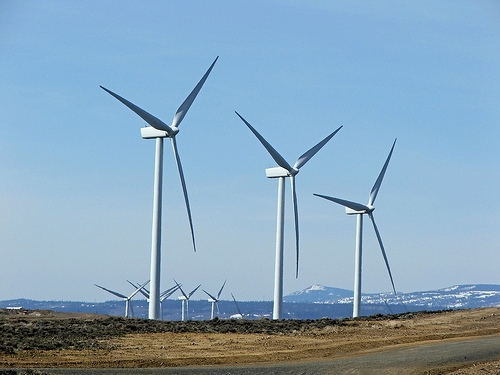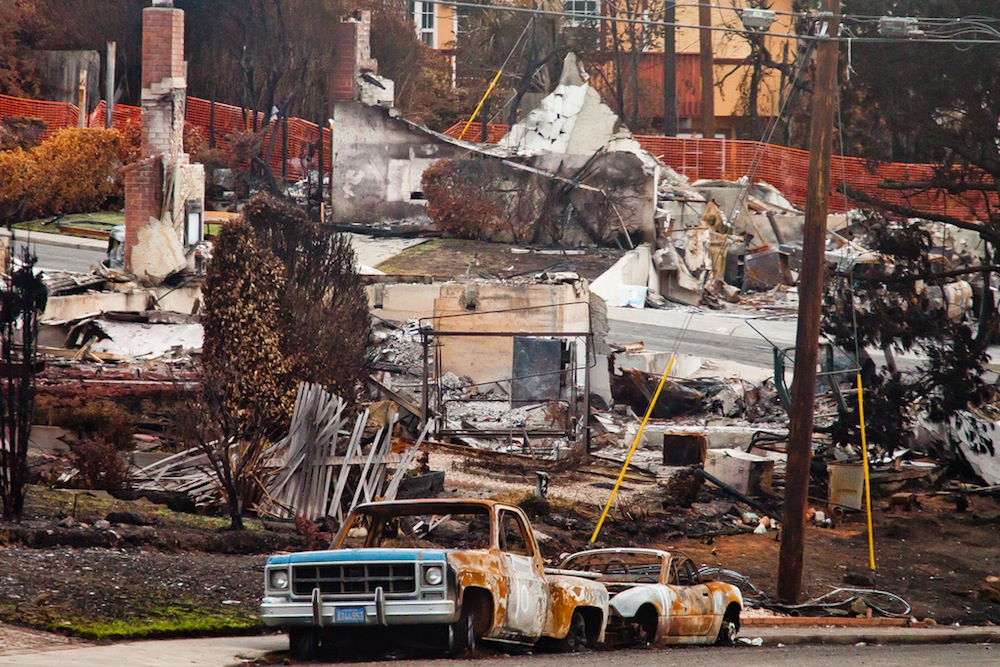
Thomas HawkThe aftermath of the San Bruno explosion, photographed 10 days after a pipeline ruptured and ignited.
It looks like Pacific Gas & Electric’s shareholders are going to have to spend $2.25 billion on safety improvements because of a 2010 natural-gas pipeline explosion in the San Francisco exurb of San Bruno.
That was the record-breaking penalty proposed this week by staff of the California Public Utilities Commission. The agency’s five commissioners will have the final say on the proposal, and PG&E will have an opportunity to try to barter down that price tag. The company says it has already spent more than $1 billion on improvements since the fatal accident.
The penalty is being characterized by the agency and media reports as a “fine,” but while fines are typically paid into general government coffers, this $2.25 billion would be invested fully in improving the safety of PG&E’s infrastructure. And the money would need to come out of shareholder profits; it couldn’t be gouged from customers by hiking their bills.
The explosion on Sept. 9, 2010, killed eight people in San Bruno’s Crestmoor neighborhood, destroyed 38 homes, and ignited a fireball that burned for nearly an hour. The investigations that followed laid bare decades of contemptible disregard for safety by PG&E, which enjoys a near monopoly on electricity and residential natural-gas sales in much of Northern California. The gas pipeline had been fabricated in 1956 using substandard materials, and it had not been properly inspected or maintained in the decades since. It tore open along a poorly welded seam and exploded beneath homes in the early evening after pressure levels spiked following a control room power outage.
From a CPUC press release [PDF]:
The Safety and Enforcement Division says that the death toll, physical injuries, and extensive damage to homes by the pipeline blast is unsurpassed in its severity and PG&E’s [record of] failures is long and reprehensible.
“There is no amount of money that will bring back the eight people who tragically lost their lives in the pipeline blast or heal the lasting wounds to the people of San Bruno. All we can do is make sure such a tragedy does not happen again. I listened to legislators and the public and determined that every single dollar available from PG&E should go straight to efforts that will ensure safety,” said [CPUC Safety and Enforcement Division Director Jack] Hagan. “The recommendation is what the Safety and Enforcement Division believes is the maximum financial penalty that can be imposed on PG&E shareholders without compromising safety. This is a penalty far greater than the CPUC, or any other state regulatory body, has ever assessed.”
San Bruno had called on the CPUC to impose a steep fine and channel much of it to mandated safety improvements. From ABC7:
“They blew up our city. Eight people were killed, a whole neighborhood destroyed,” San Bruno Mayor Jim Ruane said. The city’s lawyer says the dollar amount was arrived at by calculating safety violations dating back to when the faulty pipe was installed in 1956. Every day the utility was in violation counts.
“The potential penalties in this case, if you took all of the violations over the half century, we’re talking about, it’s roughly on the order of several hundred billion dollars,” lawyer Steven Meyers said. “We’re only asking for $2.25 billion.”
“The company has already paid a very heavy price and I think numbers like you mentioned are just unrealistic,” [PG&E CEO Tony Earley] said Monday. In a rare chat with local media, the PG&E Chairman and CEO said shareholders have already paid more than $1.5 billion in gas safety improvements and if the penalties are as high as San Bruno wants, it will be bad for business and bad for ongoing safety investments.
“I don’t have that money sitting in the bank. I’ve got to go out and raise that money from shareholders who’re willing to invest in the company and future,” he said. “I don’t write them a letter and say, ‘Please shareholders, send me $1,000 each.'”
Oh, heavens no, Tony. Why should shareholders be on the hook for a company’s deadly profiteering?



